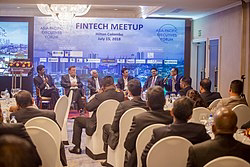Monetary innovationMonetary innovation (curtailed fintech or FinTech) is the innovation and development that intends to rival conventional monetary techniques in the conveyance of monetary services.[1][2] It is an arising industry that utilizes innovation to further develop exercises in finance.[3] The utilization of cell phones for portable banking, contributing, acquiring services,[4] and cryptographic money are instances of advancements meaning to make monetary administrations more available to the overall population. Monetary innovation organizations comprise of the two new businesses and set up monetary foundations and innovation organizations attempting to supplant or upgrade the use of monetary administrations given by existing monetary organizations.
Fintech meetup in Sri Lanka
Definition
Subsequent to inspecting in excess of 200 logical papers refering to the expression "fintech", an investigation on the meaning of fintech inferred that "fintech is another monetary industry that applies innovation to work on monetary activities."[5] Fintech is the new applications, cycles, items, or plans of action in the monetary administrations industry, made out of at least one reciprocal monetary administrations and gave as a start to finish measure through the Internet.[4] Fintech can likewise be thought of "any imaginative thoughts that further develop monetary assistance measures by proposing innovation arrangements as per distinctive business circumstances, while the thoughts could likewise prompt new plans of action or even new businesses."[6]
Key areas
Monetary innovation has been utilized to computerize ventures, protection, exchanging, banking administrations and hazard management.[7]
The administrations might start from different autonomous specialist organizations including somewhere around one authorized bank or back up plan. The interconnection is empowered through open APIs and open banking and upheld by guidelines, for example, the European Payment Services Directive.
Robo-guides are a class of mechanized monetary counselor that give monetary exhortation or speculation the executives online with moderate to negligible human intervention.[8] They give advanced monetary counsel dependent on numerical standards or calculations, and subsequently can give a minimal expense option in contrast to a human consultants.
Worldwide interest in monetary innovation expanded over 2,200% from $930 million of every 2008 to more than $22 billion in 2015.[9] The beginning monetary innovation industry in London has seen quick development in the course of the most recent couple of years, as indicated by the workplace of the Mayor of London. A little less than half of the City of London's labor force is utilized in monetary and innovation services.[10]
In Europe, $1.5 billion was put resources into monetary innovation organizations in 2014, with London-based organizations getting $539 million, Amsterdam-based organizations $306 million, and Stockholm-based organizations getting $266 million in speculation. After London, Stockholm is the second most noteworthy supported city in Europe in the beyond 10 years. Europe's fintech bargains arrived at a five-quarter high, ascending from 37 in Q4 2015 to 47 in Q1 2016.[11][12] Lithuania is beginning to turn into a northern European center point for monetary innovation organizations since the news in 2016 with regards to the conceivable exit of Britain from the European Union. Lithuania has given 51 fintech licenses since 2016, 32 of those in 2017.[13]
Fintech organizations in the United States brought $12.4 billion up in 2018, a 43% increment more than 2017 figures.[14]
Christine Lagarde, Managing Director of the International Monetary Fund tending to in 2018 at the Singapore FinTech Festival, the biggest FinTech celebration on the planet.
In the Asia Pacific area, the development will see another monetary innovation center to be opened in Sydney, in April 2015.[15] According to KPMG, Sydney's monetary administrations area in 2017 makes 9 percent of public GDP and is greater than the monetary administrations area in either Hong Kong or Singapore.[16] A monetary innovation advancement lab was dispatched in Hong Kong in 2015.[17] In 2015, the Monetary Authority of Singapore dispatched a drive named Fintech and Information Group to attract new companies from around the world. It swore to burn through $225 million in the fintech area over the course of the following five years.[18]
While Singapore has been one of the focal Fintech centers in Asia, new companies in the area from Vietnam and Indonesia have been drawing in more funding interests as of late. Since 2014, Southeast Asian Fintech organizations have expanded VC financing from $35 million to $679 million of every 2018 and $1.14 billion in 2019.[7]
Technologies
Fintech organizations utilize an assortment of advances, including computerized reasoning (AI), enormous information, mechanical interaction computerization (RPA), and blockchain.
Computer based intelligence calculations can give knowledge on client ways of managing money, permitting monetary organizations to all the more likely comprehend their customers. Chatbots are another AI-driven apparatus that banks are beginning to use to assist with client service.[19]
Enormous information can foresee customer speculations and market changes to make new systems and portfolios, examine client ways of managing money, further develop misrepresentation identification, and make promoting strategies.[20][citation needed]
Mechanical Process Automation is a man-made brainpower innovation that spotlights on robotizing explicit tedious tasks.[21] RPA assists with preparing monetary data like records payable and receivable more proficiently than the manual cycle and frequently more accurately.[22]
Blockchain is an arising innovation in finance which has driven huge speculation from numerous companies.[23] The decentralized idea of blockchain can take out the requirement for an outsider to execute transactions.[24]
Grants and recognition
Monetary magazine Forbes made a rundown of the main disruptors in monetary innovation for its Forbes 2021 worldwide Fintech 50.[25] In Europe there is a rundown called the FinTech 50,[26] which means to perceive the most imaginative organizations in fintech.[27]
A report distributed in February 2016 by EY dispatched by the UK Treasury analyzed seven driving fintech center points: the United Kingdom, California, New York City, Singapore, Germany, Australia and Hong Kong. It positioned California first for 'ability' and 'capital', the United Kingdom first for 'government strategy' and New York City first for 'demand'.[28]
For the beyond couple of years, PwC has posted a report called the "Worldwide Fintech Report". The 2019 report covers numerous subjects of the monetary innovation area, depicting the scene of the "Fintech" industry, and a portion of the arising advances in the area. What's more, it gives procedures to monetary foundations on the best way to consolidate more "fintech" innovations into their business.[29]
Standpoint
Money is viewed as one of the enterprises generally powerless against interruption by programming in light of the fact that monetary administrations, similar as distributing, are made of data as opposed to substantial merchandise. Specifically blockchains can possibly lessen the expense of executing in a monetary system.[30] While finance has been safeguarded by guideline up to this point, and endured the website blast without significant disturbance, another influx of new businesses is progressively "disaggregating" worldwide banks.[31] However, forceful implementation of the Bank Secrecy Act and cash transmission guidelines addresses a continuous danger to fintech companies.[32] accordingly, the International Monetary Fund (IMF) and the World Bank together introduced Bali Fintech Agenda on October 11, 2018[33] which comprises of 12 approach components going about as a rules for different governments and focal financial organizations to embrace and convey "fast advances in monetary technology".[34]
The New York Venture Capital Association (NYVCA) has yearly highest points to teach those keen on getting more familiar with fintech.[35] In 2018 alone, fintech was liable for more than 1,700 arrangements worth more than 40 billion dollars.[36] In 2021, one in each five dollars put by investment has gone into fintech.[37]
Difficulties and solutions
Find out additional
The models and viewpoint in this part manage the United States and don't address an overall perspective regarding the matter. (June 2018)
Notwithstanding settled contenders, fintech organizations frequently face questions from monetary controllers like giving banks and the Federal Government.[38][39] In July 2018, the Trump Administration gave an arrangement articulation that permitted FinTech organizations to apply for particular reason public bank contracts from the bureaucratic Office of the Comptroller of the Currency.[40] Federal seizure applies to state law with respect to governmentally sanctioned banks.[41]
Information security is one more issue controllers are worried about due to the danger of hacking just as the need to ensure delicate buyer and corporate monetary data.[42][43] Leading worldwide fintech organizations are proactively going to cloud innovation to meet progressively rigid consistence regulations.[44]
The Federal Trade Commission gives free assets to companies, everything being equal, to meet their lawful commitments of ensuring touchy data.[45] Several private drives propose that various layers of safeguard can help seclude and secure monetary data.[46]
In the European Union, fintech organizations should stick to information insurance laws, like GDPR. Organizations need to proactively secure clients and organizations information or face fines of 20 million euros, or on account of an endeavor, up to 4% of their absolute worldwide turnover.[47] notwithstanding GDPR, European monetary foundations including fintech firms have to refresh their administrative illicit relationships offices with the Payment Services Directive (PSD2), which means they should put together their income structure around a focal objective of privacy.[48]
Any information break, regardless of how little, can bring about direct responsibility to an organization (see the Gramm–Leach–Bliley Act)[49] and ruin a fintech organization's reputation.[50]
The online monetary area is likewise an expanding objective of appropriated forswearing of administration coercion attacks.[51][52] This security challenge is additionally looked by authentic bank organizations since they do offer Internet-associated client services.[53]
Numerous FinTech advancements have exceptionally high beginning up costs yet extremely low minor expenses for adding extra clients, successfully requiring numerous FinTechs to go about as normal monopolies.[54]






Comments
Post a Comment